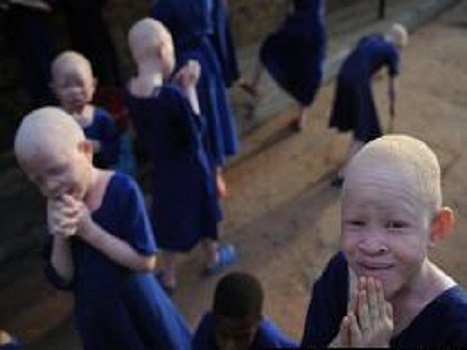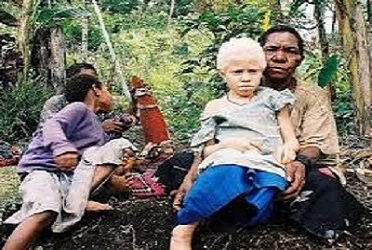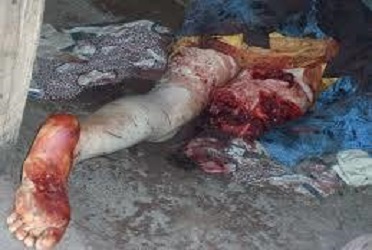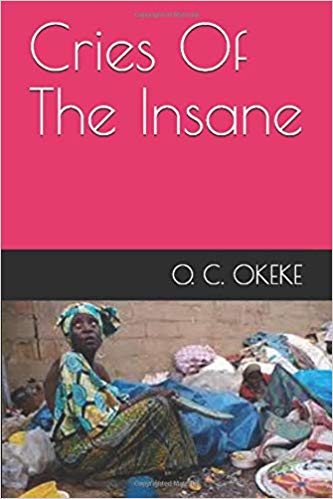PERSECUTION OF ALBINOS LIVING IN AFRICA
 Traditional superstitions and myths in Africa are so numerous and dangerous. Any small shift from normal occurrence is tagged a curse from the gods, spirits are angry, bad omen or witchcraft. This totally affects the way people think, act and treat occurrences that are outside normal such as Birth of twins, Albinos, hunchback, Osu (Outcaste), mental illness (Though people refuse to talk about this), sickle cell patients and eclipse, just to mention a few. The first Europeans in Africa were regarded as ghosts; people run away and are afraid to mingle with them. This superstitious way of beliefs and thinking has led to the establishment of many bad cultural laws and practices which has tortured Africans for decades.
Traditional superstitions and myths in Africa are so numerous and dangerous. Any small shift from normal occurrence is tagged a curse from the gods, spirits are angry, bad omen or witchcraft. This totally affects the way people think, act and treat occurrences that are outside normal such as Birth of twins, Albinos, hunchback, Osu (Outcaste), mental illness (Though people refuse to talk about this), sickle cell patients and eclipse, just to mention a few. The first Europeans in Africa were regarded as ghosts; people run away and are afraid to mingle with them. This superstitious way of beliefs and thinking has led to the establishment of many bad cultural laws and practices which has tortured Africans for decades. Albinos in Africa (especially East and southern Africa) are looked upon as abnormal humans, or ghosts in some parts. Their birth is often received with sadness as it is regarded as an abomination and a curse from the gods. Many people believe that it is a punishment from the gods and that their "disease" could be contagious. Fathers often suspect the mother of the albino child of infidelity with a white man or that the child is the ghost of a European colonist. Due to this socially rooted misconception, unacceptance and discrimination, People with albinism find it difficult to mingle with other people. They often drop out of school and face more difficulty in employment and marriage compared to other people. Also, mothers of affected children often are subjected to a great deal of stigma and psychological distress and their family members often experiencing discrimination from the community. Much of these social stigmatisation and discrimination are due to the communities' lack of education about albinism's ethology.
ALBINISM IS NOT A DISEASE BUT A GENETIC DISORDER
Today, education is going on to create awareness about albinism. It is not a curse, nor an abomination but a genetic disorder just like dwarfs and sickle cell patients. Albinism is a genetic (an inherited) disorder characterized by a substantially lower rate of melanin production. This melanin is the pigment responsible for the colour of the skin, hair and eyes. And due to a reduced or lack of it, the affected individuals have sandy coloured hair, white chalky skin and light brown or blue eyes. There are two major forms, partial or total absence of the pigment in the skin, hair, and eyes (oculocutaneous albinism) or in the eyes alone (ocular albinism).Albino people are not only found in Africa but present in other parts of the world. Occurrence, however, varies by region. In sub Saharan Africa, the rate of albinism is around 1 in 5,000 but in Europe and America, it is closer to 1 in 20,000. Albinism are generally as healthy as the rest of the population, with growth and development occurring as normal, and albinism by itself does not cause mortality, although the lack of pigment blocking ultraviolet radiation increases the risk of skin cancers, vision problem and other problems. Medical Dictionary defines Albinism as: (1) any of several inherited conditions characterized by the reduction or absence of the pigment melanin in a person or animal, resulting in lack of pigmentation in the eyes, skin, and hair. Humans with albinism usually have vision problems; (2) lack of chlorophyll in a plant or plant part, resulting in a pale colour.
PERSECUTION OF PEOPLE WITH ALBINISM
Recently, the social discrimination and stigmatization directed towards albinos is worsened by some witch doctors who believe that albinos hold magical powers. They claim, and tell their costumers, that potions and charms made from the blood and body parts of albinos are guaranteed to bring success, wealth, power and good luck. This has caused the albinos to be hunted, maimed and killed just for their body parts which will be used to make amulets and charms. Another myth that imposes a risk on people with albinism is the belief that "sexual intercourse with a woman or a girl with albinism can cure HIV/AIDS. This also has brought several rape cases against female albinos. There have been several attacks in Tanzania, Burundi and Malawi. Attacks ranging from infanticide, kidnapping, amputations, and decapitations, committed for purposes of supplying highly valued body parts used for amulets, which are then sold in underground witchcraft market.In 2007 more than seventy documented killings took place and one hundred and fifty body parts of albinos were reported to have been chopped off. Also in Malawi, the United Nation reported about 65 recorded cases of attacks in 2014. And in 2015, a study by albinism awareness group, Under the Sun, found that there were a total of 448 reported attacks on Albinos across 25 African countries. The group said that the attacks constituted "mutilations, violence, rape, attempted abductions, and that the actual number of attacks & killings are likely much higher than indicated since many are never reported or documented. Hunchbacks in Africa suffer the same discrimination and persecution as albinos, though not noticed nor reported because their population is so small.
 |
 |
GREEDY, ILLITRATE AND IMPORVERISHED SOCIETY
The driven force for the numerous attacks on albinos in Africa is the belief that albino body parts can be used in witchcraft to bring wealth, good luck and cure disease. In a society where people strongly hold onto superstition, spiritual powers and ritual wealth, they go to all length to get the blood or body parts if it can ensure them greater magical powers and wealth than other people. This increases demand for the body parts which in turn increases the cost as high as $100,000 for complete set of parts; And in a society where standard of living is so very poor, average yearly income of workers is not up to $1,000, people are forced to forget all moralities, and hustle for the much available lucrative trade. The albinos have no hiding place, are not safe even from their own family members, friends and the police, many who are greedy and collaborate with the hunters. A Tanzanian man tried to sell his albino wife for a price of US$3,000 to Congolese businessmen. Also, one Ms Phiri was offered $1,450 by two women for Esther (her albino child) so they could extract the gold they believed was in her bones. It is reported that fishermen now tie albino hair to their nets for good harvest and that miners use the bones of albinos as amulets or bury them where they are drilling for gold.The killings are so barbaric with low conviction rates. Bodies are abandoned with limbs cut off and organs ripped out. The ones alive have their limbs severed, leaving many crippled or severely maimed and traumatized. The UN warns that Malawi's estimated 10,000 albinos face "extinction" if the killings continue. Meanwhile incompetent police investigations and lenient sentences do very little to deter continued attacks.
REACTIONS FROM INTERNATIONAL BODIES
The numerous killings and attacks on people living with albinism have generated numerous attention from National and international bodies. The European Parliament strongly condemned the killing of albinos in Tanzania on 4 September 2008; The U.S. House of Representatives passed H. Resolution 1088, introduced by Rep. Gerry Connolly (D, VA), by a vote of 4181 on 22 February 2010. The resolution condemns the attacks and killings, categorizes them as human rights violations, and urges the governments of Tanzania and Burundi to vigorously prosecute such cases and to conduct educational campaigns to combat the superstitious beliefs that underlie the violent attacks; Ikponwosa Ero, the United Nations' expert on albinism recently visited Malawi, which has seen an increasing number of attacks. She urged the government to step in to protect albinos and go after their killers more aggressively.United Nations High Commissioner for Human Rights has maintained that "People with albinism have the right to live without fear or bullying, discrimination, social exclusion, killing and dismemberment." This footage was published on 13 March 2014 to overview the current situation surrounding albinos who live in fear of being murdered or captured for the purposes of murder medicine and witch doctors belief in the magical potential of albino hair and limbs. Also, the Human Rights Council resolution 23/13 of 13 June 2013 reinforced that "states would adopt specific measures to protect and preserve the rights to life and security of persons with albinism, as well as their right not to be subject to torture and ill treatment, and ensure their access to adequate health care, employment, education and justice."
SUPPORT GROUPS
Many support groups and organisations have been established in Africa and the globe to help people with albinism. Under the Same Sun (UTSS) is a Canadian founded organisation with support focused on Tanzania and based in Dar es Salam. It was founded in 2008 by Peter Ash, an albino himself, with a vision to "promote via advocacy and education, the wellbeing of persons who are often marginalised or misunderstood. We are driven by the belief that all persons have intrinsic value and since they are created in the image of God." Other organisations are National Organization for Albinism and Hypopigmentation (NOAH), Assisting Children in Need (ACN), Tanzania Albino Centre (TAC) based in Arusha in Tanzania, Albinism World Alliance, American Foundation for the Blind, etc. Across Africa, there are numerous examples of people with albinism in high socioeconomic strata, as professionals, politicians, musicians etc. Some have used their public status to support action for people with albinism.
AfryCulture Viewpoint
Hunting, killing and persecution of people with albinism in African is one of the effects of Africa's bad cultural Laws, beliefs and practices which need to end. The killings are further driven by Africans' greed and desperation to achieve wealth, influence and power creating a rush for a market that can profit them as high as 100,000 USD for an albino body part or, better still, a promise of endless wealth of ritual money from the body parts and blood.AfryCulture believe that for the hunting and killing to stop, more serious punishment, like hanging or beheading, for offenders need to be put in place. Africans are very stubborn people especially when it comes to achieving wealth. They go to any length to achieve it including bribery, killing whoever refuses to collect bribe, etc. For the discrimination, more education and awareness need to be created. Albinos are humans just like every other person. The colour of their body, eyes and hair is just a medical disorder and not a contagious disease, as many people are told. Albinos need our friendship, love, care and assistance just like every other individual.
